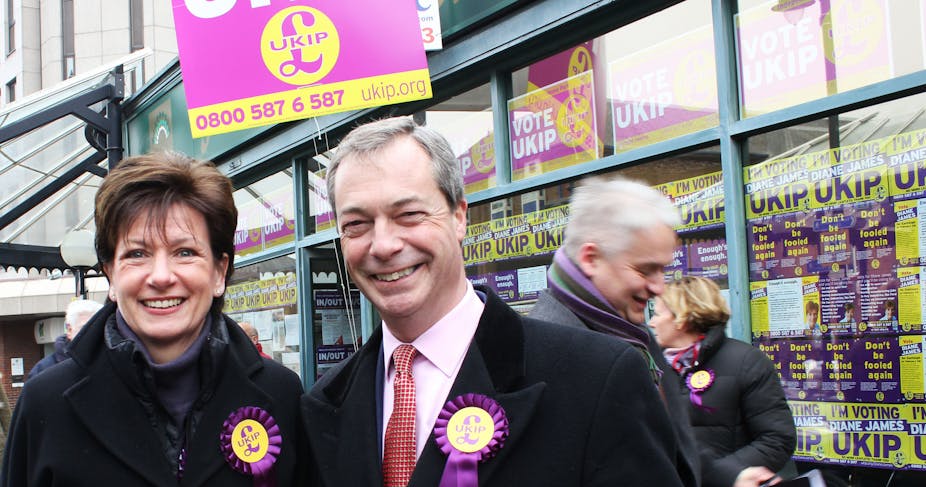Just days after the Eurosceptic UK Independence party beat the Conservative government into second place in the Eastleigh by-election, it was revealed that media tycoon Rupert Murdoch invited Nigel Farage, the charismatic UKIP leader, to his home.
Discussions were undisclosed but history would suggest that it was some kind of deal, rather than dinner, that was being cooked up.
The details of similar meetings with political leaders including Margaret Thatcher and Tony Blair in the run-up to electoral success remain sketchy – but so historically significant have these events been to the UK’s political trajectory, it’s no surprise that commentators are speculating as to the outcome of this latest get-together.
Phone hacking and the Leveson inquiry
Recent years have, of course, not been the greatest in the history of News Corp. The News of the World phone hacking scandal set off a series of events which piled pressure on the organisation: a Commons select committee, in front of which Rupert and James Murdoch were forced to appear; the arrest of numerous high profile employees; and the Leveson Inquiry which culminated in a public report making strong arguments for press regulation enshrined in law.

With the continuing costs of the investigation running into millions of dollars – and the News of the World being forced to close – damage to the company has not been insignificant. However in the context of company books which show a doubling of profits in 2013, the financial future of the company still looks pretty secure.
On the extent to which the scandal has affected the influence of the Murdoch press, politicians’ response to Leveson’s recommendations has been most telling.
Secretive talks with editors, including those from the Murdoch stable, to thrash out an alternative eventually led to the compromise of Leveson’s recommendations not being enshrined directly in statute.
While the Murdoch press in the UK has affected outrage at the deal done between the major parties on media reform - invoking none other than Churchill and the spirit of D-Day – the will be fully aware that their assiduous lobbying was not a complete waste of time. And with Murdoch already Tweeting on the validity of the royal charter, which crucially the press have yet to accept, we have yet to see evidence that the influence of the Murdoch papers is on the wane.
UKIP on the rise
UKIP meanwhile only appears to be growing in influence. Once dismissed as “fruitcakes, loonies and closet racists” by Cameron himself, the past year has seen their best ever local election results and now this triumphant performance at the Eastleigh by-election. The party’s presence in the media – and coverage of Farage - is unprecedented for a party outside the big three.
This stellar rise has been fuelled by voter disillusionment with mainstream politicians, the government’s failure to get a handle on the economic recovery. But UKIP’s success is not purely by default. On their key policy issues of EU membership and immigration, they have so effectively tapped into fears whipped up by the British popular press over years that they are now setting the political agenda. David Cameron has already promised a referendum on EU membership, and Labour are currently “apologising” for mistakes made on immigration while in office.
All this will not have displeased Murdoch who is known to hold anti-EU sympathies himself. Evidence at the Leveson Inquiry revealed this was the one issue he has consistently bickered with former leaders about. John Major noted in his witness statement that, prior to his 1997 defeat, Murdoch “made it clear that he disliked my European policies, which he wished me to change.” Texts from culture secretary Jeremy Hunt, also shown at the Inquiry, revealed that Brussels was viewed as an obstacle to News Corp’s media expansion – perhaps shedding some light on Murdoch’s EU stance.
Winners and losers
But more than seeing eye-to-eye on policy, Murdoch loves to back a winner. Farage’s charisma – and ability to sell papers - will not be lost on him. While he has rightwing leanings, Murdoch bears no allegiance to any particular party.
His support is transitory - as Gordon Brown found out in the run-up to the 2010 election, and Cameron’s government will be getting a stark reminder of now.
And as the Leveson inquiry showed – neither is his support unconditional. If it is offered, he’s looking for something in return. In Major’s case it was specific EU policies, in the case of Brown, support for News Corp’s UK media expansion. Farage, riding high at the moment, but likely to crash and burn - as has happened before - when his policies are properly scrutinised, might well gain press support in the short-term.
But furthering UKIP’s electoral success is unlikely to be Murdoch’s broader aim. Speculation is already rife that the removal of Cameron might have been the subject of discussions – perhaps pressuring the prime minister to take a harder line on Europe, or even simple revenge for commissioning of the Leveson in the first place.
Either way, from the view of history, this political game-playing is more likely to benefit Murdoch more than anyone else.

